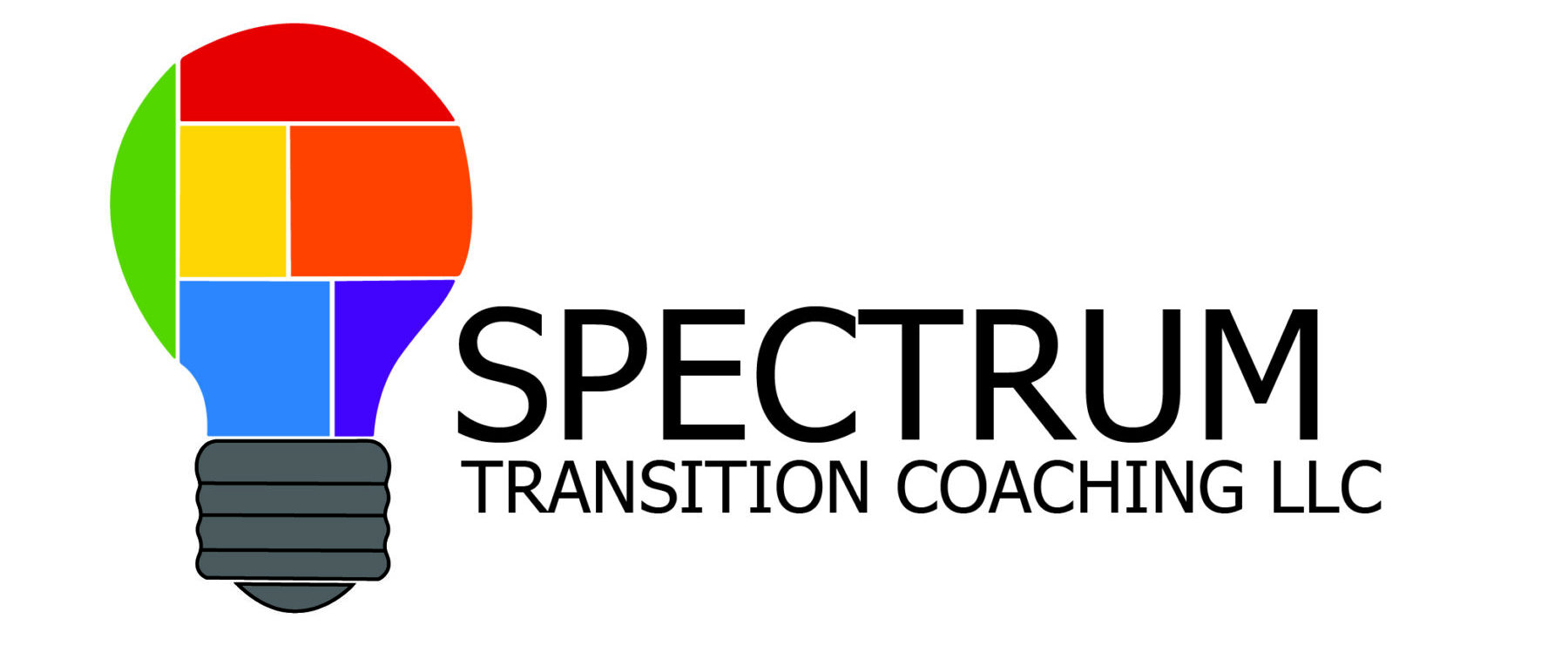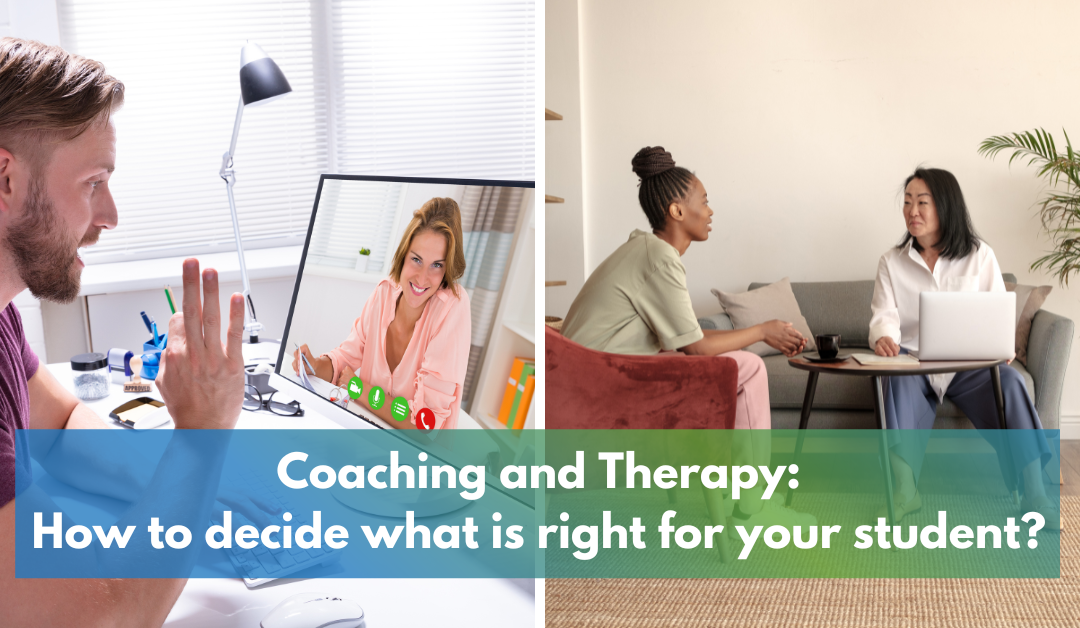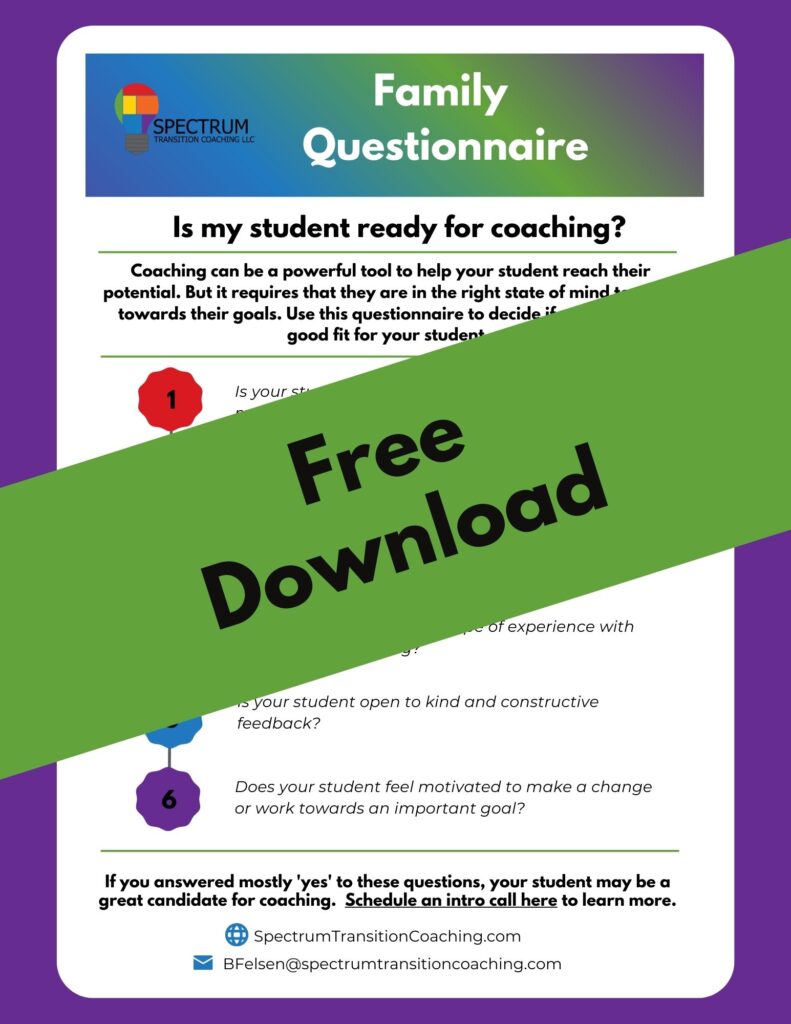In the world of autism, one of the best things you can do for your student is to build their support team. It’s important for your student to have trusted adults, outside of parents, to guide their academic and personal development.
But with so many roles and titles, it can get confusing very quickly! Here’s a few of the people your student may be working with:
- Therapist
- Occupational therapist
- Autism Spectrum Disorder specialist
- Social worker
- Speech language pathologist
- Guidance counselor
- Tutor
- Executive function coach
- Social skills specialist
- Classroom aide
Today, we’re going to focus on two main categories – therapy and coaching. At the risk of oversimplifying two vast fields, here’s my summary:
Therapy helps autistic young adults explore their emotions as they seek to understand themselves better.
Coaching helps autistic young adults manage their emotions as they pursue their goals.
Diving Deeper into Therapy and Coaching
According to Psychology Today, therapy is “is a form of treatment aimed at relieving emotional distress and mental health problems. Psychotherapy encompasses many types of treatment and is practiced by a range of clinicians using a variety of strategies. The critical aspect is that the client or patient works collaboratively with the therapist and can identify improvement and positive change over time.” For autistic young adults, therapists may help them make sense of their diagnosis, understand how it affects their personal relationships, unpack family dynamics or help students manage depression and anxiety.
Coaching is a process where a trained guide (the coach) helps another person (the client or coachee) achieve goals. Coaches are trained to be good listeners and ask powerful questions to help clients articulate and prioritize goals. Once goals are identified, coaches use their skills to help clients define the specific steps needed to achieve these goals. Coaches meet regularly with clients to provide support and accountability. Read my full blog about “what is coaching?” here.
Coaching and therapy work well in tandem. Oftentimes, my most successful coaching clients are also working with a therapist to do the deeper, self-discovery work.
Below are a few ways that therapists and coaches can work together to help your student grow.
During the Job Search and Application Process
A client came to me a year after graduating college with the goal of finding full-time employment in their chosen field. One of the first things we talked about was getting back in touch with former internship supervisors and professors to ask them to provide references during the job search. Together we developed a plan to contact these individuals but when I contacted my client for an accountability check in, they still had not initiated any contact. After asking some probing questions during our next session, it became clear that my client was quite worried they’d be judged poorly because they had only been working part-time in the year following graduation.
I suggested that my client discuss this with their therapist. After a few therapy sessions spent working through those feelings, my client felt comfortable enough to reach out and ask for references. This task certainly wasn’t easy for my client, but they understood the importance of references to the job search and knew they had support from me and from their therapist while working through this uncomfortable step.
Sharing Recent Diagnoses
A therapist in my professional network conacted me recently to talk about a young adult they were working with who had recently been diagnosed with autism and significant anxiety and depression. The young adult was aware of the diagnosis and was very concerned about how and when, or even IF, to share it with classmates and teachers. The therapist was helping the young adult process his feelings and was looking for a coach who could help the young adult work through what he might say and how he could handle questions if he disclosed his autism.
I was able to brainstorm with this young adult regarding ways he might disclose, ways others might react, and how he would handle these possible scenarios. He was able to role play with me to practice. I then worked with him to identify a few individuals he thought would be the most open and accepting of what he had to say and select one with whom he wanted to have this scary conversation.
The Bottom Line
If your student has a relatively new autism diagnosis or seems ‘stuck’ in their day-to-day tasks, it may be worthwhile to pursue a conversation with a therapist.
If your student understands their diagnosis and what it means to them, they may be a good fit for coaching. I’ve created a family questionnaire to help you decide if your student is ready for coaching. Grab the free download below to start this important conversation with your autistic student.
No matter what your student’s particular team looks like, know that you are doing them a service by facilitating these relationships. By working with multiple trusted adults, your student has a team in their corner, rooting them on as they navigate life’s transitions.


